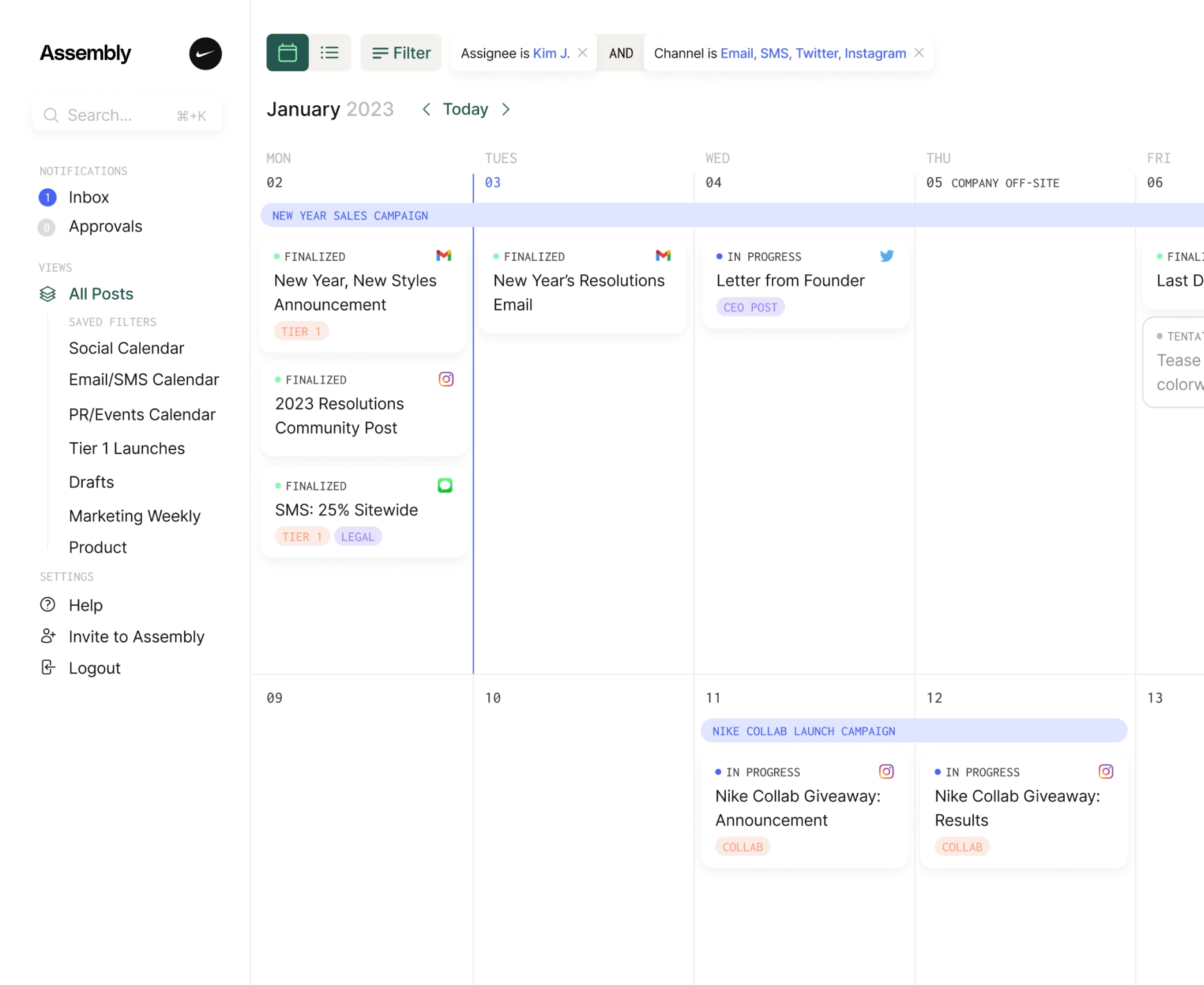
7 Sprout Social Alternatives for 2025

Intro
Sprout Social has long been a staple in the social media management space, offering a suite of tools for businesses to manage their online presence. However, in recent years, newer competitors with unique features have emerged, providing alternatives that might better suit your needs.
Whether you're seeking more advanced features, better pricing, or a platform that aligns more closely with your workflow, it's worth considering these 7 alternatives to Sprout Social. Our top recommendation is Assembly, a platform designed to streamline and enhance your social media management experience.
Assembly
If you’re looking for a more modern and powerful alternative to Sprout Social, Assembly is our #1 recommended tool. Assembly streamlines content creation, scheduling, and engagement across multiple platforms, and importantly has features no other platform does like robust auto-engagement, LinkedIn user tagging, Slack integrations, and more.
Pros of Assembly
- Automatic Scheduling: Assembly supports scheduling for all major social platforms (and can even schedule CMS content to platforms like Webflow!). Assembly will also suggest a best time to post based on platform data.
- Auto-Engagement: Offers auto-engagement capabilities (automated likes, comments, and reposts) on platforms like LinkedIn, Twitter, and Instagram.
- Friendly Pricing for Teams: Affordable plans that scale with your team size.
- Easy Cross-Posting: Effortlessly cross-post content across multiple social media channels in just one-click.
- Robust Approval System: Streamline content approvals with built-in workflows.
- Slack Integration: Seamlessly integrate with Slack for both approvals and notifications.
- Feature-Rich Content Calendar: One of the most robust content calendars for planning and visualization purposes.
- Proactive Support: Compared to larger platforms like Sprout, Assembly has extremely proactive and quick support, making it a great choice from a reliability standpoint.
Why Choose Assembly?
Assembly stands out as a top choice due to its emphasis on collaboration, advanced features, and user-friendly interface. It's designed to accommodate the needs of growing teams and businesses that require a comprehensive solution without the hefty price tag associated with Sprout Social.
Buffer
Buffer is known for its simplicity and affordability, making it a popular choice for individuals and small teams. It provides essential tools for scheduling and publishing content across various social media platforms.
Pros of Buffer
- Budget-Friendly: More affordable than Sprout Social, with a free plan available.
- Supports Emerging Platforms: Includes support for BlueSky and Mastodon.
- User-Friendly Interface: Easy to navigate, ideal for beginners.
Cons of Buffer
- Basic Functionality: Lightweight scheduler better suited for individuals than teams.
- Limited Features on Basic Plan: The base tier for Buffer comes with frustrating limitations — for example, posting Twitter threads is not supported.
- Account Management Challenges: Difficult to switch between accounts when managing multiple social profiles.
Considerations
Buffer is ideal for individuals or small teams with basic scheduling needs. However, larger teams managing more than one account, content agencies, etc. may find it lacking in advanced features and collaboration tools.
StatusBrew
Statusbrew offers a comprehensive social media management solution, including scheduling, analytics, and customer engagement tools. It's designed to help businesses streamline their social media workflow.
Pros of Statusbrew
- Scheduling and Analytics: Robust tools for planning and analyzing social media content.
- Approval Workflow: Supports an approval process.
- AI Inbox Management: Uses AI to manage and prioritize incoming messages.
Cons of Statusbrew
- No Auto-Engagement Features: Lacks auto-engagement capabilities that come with platforms like Assembly.
- Missing Tagging Functionality: Cannot tag users on Facebook, limiting engagement options.
- Reporting Bugs: Some users have reported issues with the reporting and analytics features.
Considerations
Statusbrew is suitable for businesses that need solid scheduling and approval workflows. However, despite having close to feature parity with Sprout Social, we think there are better alternatives in this list to consider at the price point.
Later
Later is a social media scheduling tool with a strong emphasis on visual platforms, particularly Instagram. It offers features that cater to businesses focused on visual content marketing.
Pros of Later
- Visual Content Planning: A good choice for planning and scheduling primarily Instagram posts.
- Linkin.bio Feature: Provides a shoppable Instagram feed.
- Hashtag Suggestions: Helps optimize posts for better reach.
Cons of Later
- Limited Platform Support: Strongest on Instagram; other platforms have fewer features.
- Collaboration Limitations: Less robust team collaboration tools compared to competitors.
- Analytics Depth: Offers basic analytics, which may not suffice for data-driven strategies.
Considerations
Later is a great tool for businesses heavily invested in Instagram and visual content. For teams looking to post on other channels, or more advanced collaboration, you may want to explore other platforms.
CoSchedule
CoSchedule is a marketing suite that combines project management with social media scheduling, focusing on content marketers and editorial teams.
Pros of CoSchedule
- Editorial Calendar: Comprehensive calendar for planning content across teams.
- Integrated Marketing Tools: Combines social scheduling with project management.
- Team Collaboration: Supports assigning tasks and setting deadlines.
Cons of CoSchedule
- Steeper Learning Curve: May require time to fully utilize all features.
- Pricing for Full Suite: Accessing all features can be costly.
- Limited Social Features: Social media tools are less advanced compared to dedicated platforms.
Considerations
CoSchedule is ideal for content marketing teams needing to integrate project management with social scheduling. If your primary need is advanced social media features, other platforms may be more suitable.
Planable
Planable focuses on simplifying the content review and approval process, making it easier for teams to collaborate on social media content.
Pros of Planable
- Visual Content Preview: Similar to Later, works better for Instagram-focused teams.
- Approval Workflow: Streamlined process for approving content before it goes live.
Cons of Planable
- Limited Analytics: Basic reporting may not meet all analytical needs.
- Feature Limitations: Lacks some advanced scheduling and engagement features.
- Pricing for Teams: Costs can add up for larger teams or agencies.
Considerations
Similar to Later, Planable excels at Instagram-focused content. For comprehensive social media management, including advanced analytics and engagement tools, you might need to consider other platforms.
Zoho Social
Zoho Social is part of the larger Zoho ecosystem, offering social media management tools that integrate with Zoho's CRM and other business applications.
Pros of Zoho Social
- CRM Integration: Seamless connection with Zoho CRM for lead management.
- Monitoring and Listening: Offers tools to track brand mentions and keywords.
Cons of Zoho Social
- Limited Advanced Features: May lack some of the advanced features found in other platforms.
- Interface Learning Curve: Users not familiar with Zoho may find the interface less intuitive.
- Delayed Feature Updates: Can be slower to adopt new features compared to competitors.
Considerations
Zoho Social is a good fit for businesses already utilizing the Zoho suite. If you're looking for advanced social media features and aren't tied to the Zoho ecosystem, exploring other options might be beneficial.
Conclusion
Choosing the right social media management tool is crucial for enhancing your online presence and achieving your marketing goals. While Sprout Social offers a comprehensive platform, it's essential to assess whether it aligns with your current needs and budget. Alternatives like Assembly provide advanced features, better collaboration tools, and more affordable pricing, making them worthy of consideration.
Each platform highlighted has its strengths and ideal use cases. By evaluating the pros and cons, you can select a tool that best fits your team's workflow and objectives. However, for most teams looking for a robust alternative to Sprout Social, Assembly is our recommended choice.
Ready to start growing on social media?
Assembly is an end-to-end social media management tool. Join 500+ marketers and agencies who have made the switch.






